工業用輪
工業用輪的應用與發展趨勢
 東鉝一、工業用輪的基本概念
東鉝一、工業用輪的基本概念
工業用輪是一種廣泛應用於製造業、物流運輸、建築工程及其他工業領域的輪子。其主要作用是支撐、移動和運輸設備,提升工作效率並減少人力負擔。根據不同的使用環境和需求,工業用輪的材質、設計與功能各異,例如高承重輪、耐高溫輪、防靜電輪、不銹鋼輪等。
工業用輪的結構通常由輪框、輪胎與軸承組成。常見的材質包括橡膠、聚氨酯(PU)、尼龍、金屬等,各自具有不同的特性。例如,橡膠輪具有良好的減震效果,適合不平坦的地面;聚氨酯輪耐磨且承載能力強,適合重型設備;尼龍輪則適合低摩擦需求的場景,如醫療設備與實驗室儀器。
二、工業用輪的主要類型與應用場景
固定輪與萬向輪
固定輪:只能沿直線運動,適用於需要穩定性高的設備,如大型機械與輸送設備。
萬向輪:可自由旋轉360度,靈活性高,常見於物流推車、醫療設備、工廠設備等。
重型與輕型工業用輪
重型工業用輪適用於承載能力要求較高的場景,如貨倉搬運、機械設備等。
輕型工業用輪則適合日常搬運、辦公設備、商用推車等。
特殊功能輪
防靜電輪:應用於電子工業,防止靜電損害精密儀器。
耐高溫輪:可承受極端高溫環境,如烤箱、工業爐。
氣動輪:適合戶外崎嶇地形,如建築工地和農業機械。
三、工業用輪的市場需求與發展趨勢
隨著工業自動化與物流產業的發展,工業用輪的需求持續增長。以下是幾個主要的市場趨勢:
高性能材料應用
為了提高耐用性與安全性,許多製造商開始採用更高性能的材料,如高強度聚氨酯、不銹鋼輪架等。這些材料不僅能提高承載能力,還能適應更多極端環境。
智能化與自動化發展
在自動化工廠與智慧物流系統中,工業用輪不僅需要具備基本的移動功能,還可能結合感應技術與物聯網(IoT),用於自動引導車(AGV)與無人搬運系統,提高物流與生產效率。
環保與可持續發展
近年來,許多企業開始重視環保問題,開發可回收材料製成的工業用輪,例如可降解橡膠或環保塑料,以減少碳排放並符合環保法規。
客製化需求增加
不同行業對工業用輪的需求不同,例如醫療行業需要無菌、防靜電輪,重工業則需要超耐磨、高承重輪。因此,製造商開始提供客製化解決方案,根據客戶需求設計不同規格與功能的輪子。
四、選購工業用輪時的考量因素
承載能力:根據設備重量選擇適合的承重能力,以確保運行穩定性與耐用性。
地面環境:不同地面材質對輪子的影響不同,例如光滑地面適合硬質輪,粗糙地面則需要柔軟輪以減少震動。
使用頻率:高頻率使用的設備應選擇耐磨性高的材質,如聚氨酯或尼龍。
特殊環境要求:如高溫、防靜電、防腐蝕等特殊需求,需選擇對應功能的輪子。
五、結論
工業用輪是現代工業、物流與商業運營中不可或缺的零件,其技術與材料的發展正不斷提升其性能與應用範圍。隨著智能製造、環保材料與客製化趨勢的興起,工業用輪市場將迎來更多創新與發展機會。在選擇合適的工業用輪時,企業應考量應用場景、承載能力、耐用性與特殊需求,以確保設備運行的穩定性與高效性。
I. Basic Concepts of Industrial Wheels
Industrial wheels are widely used in manufacturing, logistics, construction, and other industrial sectors. Their primary function is to support, move, and transport equipment, improving work efficiency and reducing manpower burden. Depending on the usage environment and needs, industrial wheels vary in material, design, and function, such as high-load-bearing wheels, high-temperature resistant wheels, anti-static wheels, and stainless steel wheels.
The structure of an industrial wheel typically consists of a rim, tire, and bearings. Common materials include rubber, polyurethane (PU), nylon, and metal, each with different properties. For example, rubber wheels have good shock absorption and are suitable for uneven surfaces; polyurethane wheels are wear-resistant and have high load-bearing capacity, suitable for heavy equipment; nylon wheels are suitable for low-friction applications, such as medical equipment and laboratory instruments.
II. Main Types and Application Scenarios of Industrial Wheels
Fixed Wheels and Casters
Fixed Wheels: Can only move in a straight line, suitable for equipment requiring high stability, such as large machinery and conveying equipment.
Casters: Can rotate 360 degrees freely, offering high flexibility. Commonly used in logistics trolleys, medical equipment, and factory equipment.
Heavy-duty and Light-duty Industrial Casters
Heavy-duty industrial casters are suitable for scenarios requiring high load-bearing capacity, such as warehouse handling and machinery.
Light-duty industrial casters are suitable for daily handling, office equipment, and commercial trolleys.
Special Function Casters
Anti-static Casters: Used in the electronics industry to prevent static electricity from damaging precision instruments.
High-Temperature Resistant Casters: Can withstand extreme high-temperature environments, such as ovens and industrial furnaces.
Pneumatic Casters: Suitable for rugged outdoor terrain, such as construction sites and agricultural machinery.
III. Market Demand and Development Trends for Industrial Casters
With the development of industrial automation and the logistics industry, the demand for industrial casters continues to grow. The following are some key market trends:
High-Performance Material Applications
To improve durability and safety, many manufacturers are beginning to use higher-performance materials, such as high-strength polyurethane and stainless steel wheel frames. These materials not only improve load-bearing capacity but also adapt to more extreme environments.
Intelligent and Automation Development
In automated factories and smart logistics systems, industrial wheels not only need basic mobility but may also incorporate sensing technology and the Internet of Things (IoT) for use in Automated Guided Vehicles (AGVs) and unmanned transport systems, improving logistics and production efficiency.
Environmental Protection and Sustainable Development
In recent years, many companies have begun to prioritize environmental protection, developing industrial wheels made from recyclable materials, such as biodegradable rubber or environmentally friendly plastics, to reduce carbon emissions and comply with environmental regulations.
Increasing Customization Needs
Different industries have different requirements for industrial wheels. For example, the medical industry requires sterile, anti-static wheels, while heavy industry requires ultra-wear-resistant, high-load-bearing wheels. Therefore, manufacturers are beginning to offer customized solutions, designing wheels with different specifications and functions according to customer needs.
IV. Considerations When Purchasing Industrial Wheels
Load Capacity: Selecting the appropriate load capacity based on the equipment weight ensures operational stability and durability.
Ground Environment: Different ground materials have different effects on wheels. For example, smooth ground is suitable for hard wheels, while rough ground requires soft wheels to reduce vibration.
Usage Frequency: Equipment used frequently should be made of highly wear-resistant materials, such as polyurethane or nylon.
Special Environmental Requirements: For special needs such as high temperature, anti-static, and corrosion resistance, wheels with corresponding functions should be selected.
V. Conclusion
Industrial wheels are indispensable components in modern industry, logistics, and business operations. Advances in technology and materials are continuously improving their performance and application range. With the rise of smart manufacturing, environmentally friendly materials, and customization trends, the industrial wheel market will usher in more opportunities for innovation and development. When selecting suitable industrial wheels, companies should consider the application scenario, load-bearing capacity, durability, and special requirements to ensure the stability and efficiency of equipment operation.



